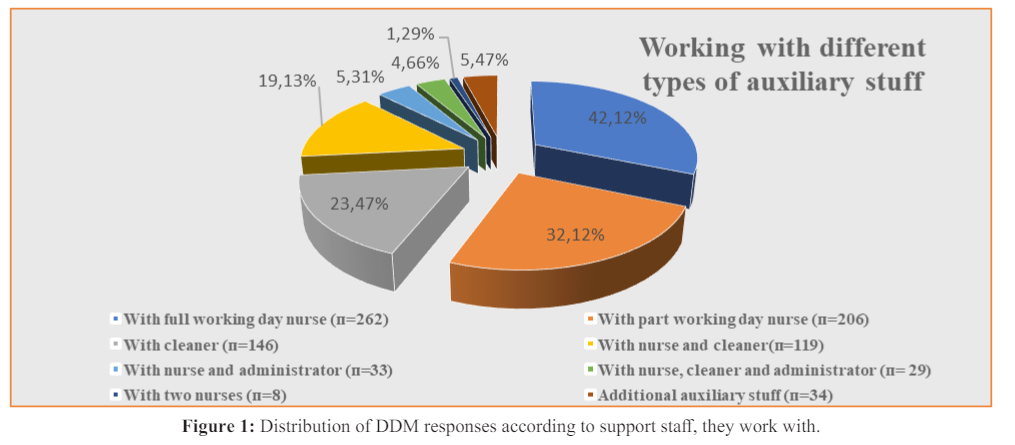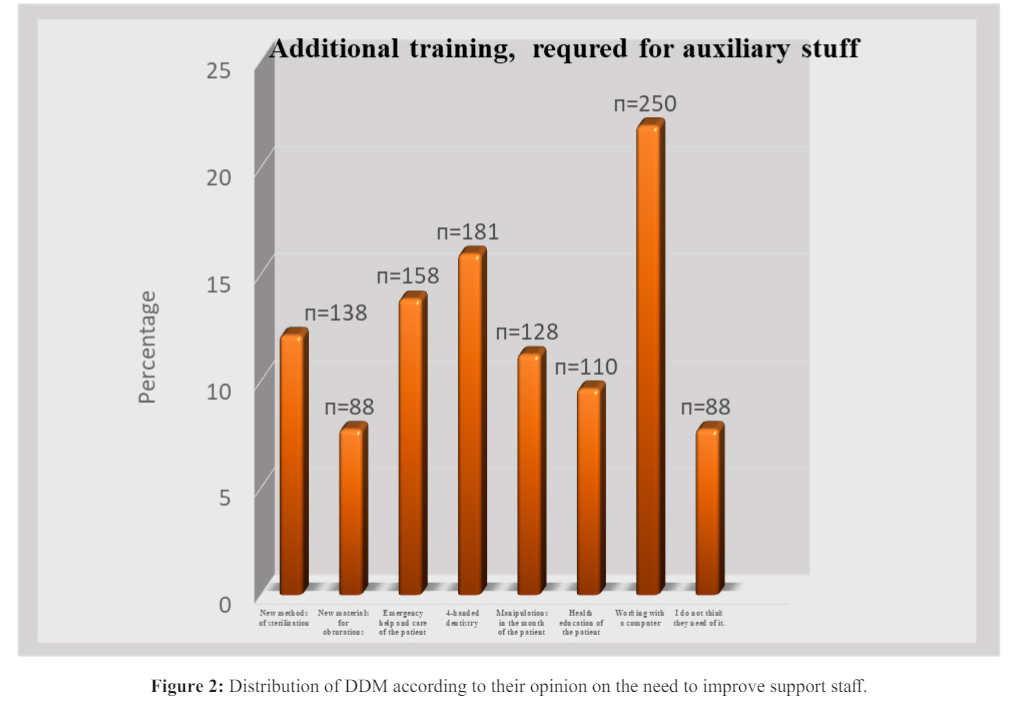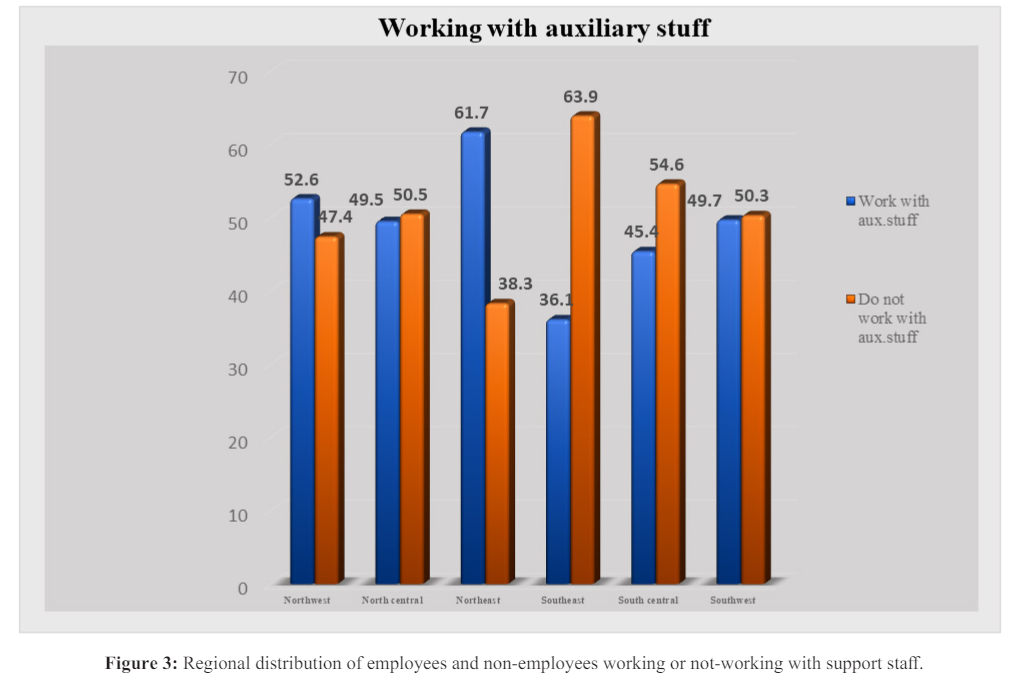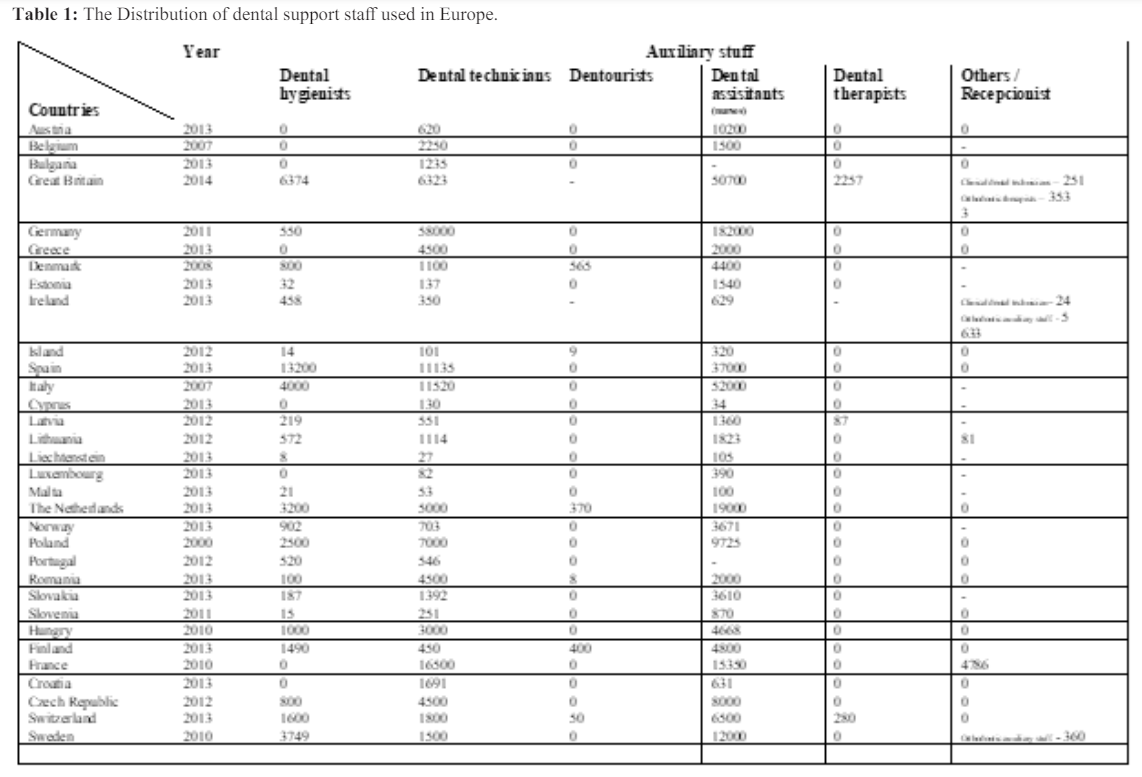Working With Auxiliary Staff - A Prerequisite for Good Dental Practice
Author'(s):Tsokov K*
Chief Assistant, Department of Dental Public Health, FDM, MU Sofia.
*Correspondence:
Tsokov K, PhD - Chief Assistant, Dental Public Health Department, Faculty of Dental Medicine, Medical UniversitySofia
Received: 10 Sep 2023; Accepted: 29 Oct 2023; Published: 06 Nov 2023
Citation: Tsokov K. Working With Auxiliary Staff - A Prerequisite for Good Dental Practice. Addict Res. 2023; 7(1): 1-5.
Abstract
Introduction: The presence of responsible, legally registered and accountable auxiliary staff is a necessity in the organization of good dental practice.
Objective: To analyze the importance of working with auxiliary staff to achieve and maintain a high level of good dental practice in the market mechanisms. MM: Anonymous survey conducted among Doctors of Dental Medicine (DDM) in the 28 regional Regional Officess of Bulgarian Dental Association (RO of BgDA) / 2011-2013. Data were processed with SPSS.
Results: The trend is for work without auxiliary staff: 52.41% work without and 47.59% with support staff. 84.50% of them are graduates and 75 (14.50%) are without a diploma. The majority of DDMs require support staff to improve in the field of computer work - 21.91% and four-handed work - 15.86%.
Conclusion: More than half of dentists still work without support staff. We work with a variety of support staff. The qualification of the assistants is gradually increasing.
Keywords
Introduction
Part of the organization of good dental practice includes working with responsible, legally registered and accountable support staff. For the dentist in today's working conditions, cooperation and collaboration with support staff is a must. In this way, the doctor saves time, effort, energy. At the same time, it leads to improved productivity. Working with support staff is recommended both in the planned and in market economy conditions.
In Bulgaria there isn’t any specially trained support staff to work in the dental offices. Mainly the work is performed by general nurses. For a very short time, a small number of nurses with a “dental profile” have been educated at the Medical Institute for Paramedical Staff in Plovdiv [1].
Material and Methods
The monitoring was conducted in the form of a direct anonymous survey as of 2011-2013. A representative sample of the dentists registered with the 28 regional regional offices of the Bulgarian Dental Association was included. The actual study was preceded by a pilot study. The data was collected as follows: for the pilot study September-December 2011; for the main study - in the period January 2012 - September 2013. The data were processed with SPSS. Of the 1,900 questionnaires distributed, proportionally in all districts of the country, 1,331 (including 175 pilots) attended the postgraduate seminars of the RO of the BgDA, which is 16.15% of the total number of Doctors of Dental Medicine (DDM), with 95% confidence interval ( 15.40% divided by 17.00%), with a response rate of 70.10%.
Results
The analyzed 1307 answers to the question: “whether you work with support staff?” show that 685 (52.41%) work without support staff, and 622 (47.59%) use different support staff.
The type and number of support staff used by the Dental Doctors are different. The services only of nurses or nurses and other support staff (nurse, administrator) has been used. Four hundred sixty eight (75.24% of those using the services of support staff) work with nurses (full-time or part-time). Additionally, to the help of a nurse, 119 of the doctors add the services of a cleaner, and 33 use a nurse and an administrator. Twenty-nine DDMs work with three support staff (nurse, medical orderly and administrator and only 8 dentists work with two nurses (Figure 1).
Sixty two DDM work with an administrator and 294 dentists use the help of a cleaner. Thirty-four doctors, in addition to the already mentioned support staff, use the services of "other", unspecified, support staff. These data show that the use of support staff is inadequate. There is a contradiction between the need and the resources of the dentist. Six hundred eighty fife of the doctors are forced to perform the duties of support staff. This is not a positive fact. It is rather a disadvantage. The data show that out of 476 nurses working in the practices, 407 (84.50%) of them are graduates and 75 (14.50%) are without a diploma, trained as dental assistants by the dentist they work for. The distribution by districts shows: the most graduated support staff is in the North Central Region - 94.37%, against 78.43% in the Southwest. An obligatory condition for the medical and administrative support staff is the constant enrichment of their knowledge and qualification in order to improve work efficiency. The nurses cannot lag behind with their knowledge and skills in view of the constant updating of the methods of treatment and the equipment used in this direction. An obligatory requirement in their characteristics is the use of modern computer equipment. DDM respondents say that nurses are still not sufficiently trained to "work four-handed". However, 15.9% of them believe that the nurses are well prepared in this regard. Extensive amount of the nurses stay away from the possibility of following the sequence of the intervention and do not actively participate in the course of treatment without an engagement from the doctor. A fact that requires not only the improvement of the nurse, but also legal regulation of her rights to participate directly in some of the stages of treatment, legitimizing her direct work in the oral cavity. These views are based on the answers in which directions the training of a nurse should continue (Figure 2).
The most widespread work with support staff on the territory of Rep. of Bulgaria is in the Northeast Region - 61.7%, and the most work without support staff is in the Southeast Region - 63.9% (Figure 3). Division of the country of 6 six regions adopted by EUROSTAT is used.
The variety of auxiliary stuff in dental practices in European countries is great. The distribution of this stuff is shown in Table1.
Discussion
Despite the benefits of support work, the data shows that the increase in the share of support staff in the period 1996-2000 was followed by a stagnation for the period 2000-2008 and a sharp decline for 2008 and 2009 [2].
In Bulgaria in 1992 there were three medical colleges for educating dental technician staff - in Sofia, Plovdiv, Varna. By 1950, 30 dental laboratories and about 250 dental technicians were registered in Bulgaria. The first two-year school dates back to 1950 and the first class consists of 53 people (1953). Until 1995, there were 3,200 dental technicians in Bulgaria with a secondary or higher education, working or having completed their employment [3].
There is no enough data on the availability and use of dental support staff in our country, excluding some manuals for dental technicians and at last the dissertation of dr. Antonova [4]. A guide to the work of the nurse in the dental offices was published in 1985 under the editorship of St. Ivanov [5]. And one more published in 2021. Every dentist, using support staff, trains the nurse in their own practice. It is expected that by equating the education of nurses from secondary special education to higher education, there will be a more tangible invasion of their use in dental offices. The tendency to use a nurse and especially an administrator will grow at a negligible pace due to the fragmentation of offices and the very rare operation of several dentists in one place. If the tendency




to consolidate dental practices for more services in one place is maintained. Most likely, this support staff will also find its wider place.
According to Eeva Widstrom et al., support staff in European countries are divided and trained as oral hygienists, therapists, dental assistants, dental technicians (dental technicians). For the EU and the EEC, by 1999, 1,200 oral hygienists and therapists were reported. Over 30% of them are in the United Kingdom and Germany. Relatively large numbers are in Sweden, Finland and the Netherlands [6]. Almost one oral hygienist per six dentists is in Sweden, Finland and the Netherlands. The clinical support staff known as therapists in the United Kingdom working in the public dental sector were 366 in 1994. In countries such as Finland, Netherlands,Denmark, Portugal, exists trained dentourist. There are almost no support staff in Belgium. Although working with hygienists increases the capacity of dental practice, few DDMs are willing to hire hygienists. As the main assistants of DDM in the field of prosthetics and orthodontics are dental technicians [6].
In the planned economy, dental technician positions were also full- time and received remuneration from the state (salary) regardless of the quantity and quality of their products. In the new conditions, their remuneration depends daily on how many DDMs have accepted them as dentists / dental technician and provide them with a certain job. The dental technician / DDM ratio is highest in Germany and Italy and lower in Norway. According to Abelsen, dentists say that they have given about 40% of their time to dental hygienists and authorized them for activities such as examinations, screenings and other ancillary procedures [6].
"Chair assistants" are poorly used in Belgium, France and Luxembourg. Support staff are widely used in the UK [6-8]. In Norway, for example, DDMs provide about 40% of hygienists' time by delegating a number of activities, 60% of DDMs consider it appropriate to delegate more rights, but only 21% say hygienists are at the front door in dental care [9]. Across Europe, there are large differences in regulations regarding the ability of an assistant to work in the patient's mouth and their level of independence from the instructions and supervision of a dentist. There are significant international differences in the level of training required and the obligation to register with an association or other body. In addition, in the Netherlands, dental hygienists are not legal assistants in dental medicine, as they form an independent profession.
Dental Hygienists
Dental hygienists exist in most countries - 23, although they do not need to register in six - Cyprus, the Czech Republic, Italy, Lithuania, the Netherlands and Poland. Slovenia has had hygienists since 2005, although there are no plans for their registertration.
Qualification almost always leads to a diploma or degree with which the hygienist must register with a competent authority in most countries. The training where you have it is 2 or 3 years. It only takes one year in Hungary. Conversely, in the Netherlands, Lithuania and the United Kingdom, training can last up to 4 years. Different countries have different rules regarding the degree of control of hygienists and the duties they can perform. Many countries allow their hygienists to diagnose and plan treatment.
Dental Technicians
Dental technicians who provide laboratory technical services are recognized in all countries. Formal training is offered in all but two countries (Luxembourg and Cyprus) and takes place in special schools. The training is for a variable number of years (2 to 5). In 22 countries, they must be registered to provide services. Dental technicians usually provide services only to dentists.
Dental technicians who provide laboratory technical services are recognized in all countries. Formal training is offered in all but two countries (Luxembourg and Cyprus) and takes place in special schools. The training is for a variable number of years (2 to 5). In 22 countries, they must be registered to provide services. Dental technicians usually provide services only to dentists.
Only 5 countries (Denmark, Finland, the Netherlands, the United Kingdom and Switzerland in some cantons) allow dental technicians to provide oral health services (complete or partial dentures) - directly into the patient's mouth. This means that they are trained to work in patients' mouths. The United Kingdom introduced this class of assistants only in 2007. Training is usually provided in special schools, sometimes - but not always - linked to dental schools. The training is for one or two years, often after prior training as a dental assistant in the chair or dental technician.
Dental Assistants
In all countries, dentists have staff, otherwise known as dental surgery assistants, dental nurses or dental chair assistants, or dental receptionists, who can assist with chair duties.
Dental Therapists
In several European countries, there is an official recognition for other types of clinically operating goals - dental therapists who provide limited services for clinical conservation and endodontics (Sweden, Switzerland and the United Kingdom) and orthodontic assistants (Sweden and the United Kingdom).
Other support staff
Many countries allow dental nurses to provide patients with oral training or have an official support class (without registration) to provide this service.
Conclusion
Despite the need, usefulness, ergonomics and prestige of dental practice when working with support staff, more than half of dentists still work without support staff. Work is done with a variety of support staff, but in a limited number of dental practices. Improving the skills and ways of communicating with patients, expanding the work of support staff in the field of administration is a mandatory component and implies their ongoing and constantly improvement [8].
References
- Widström EKA Eaton, Van den Heuvel J. Dentistry in the EU and EEA a Council of European Chief Dental Officers Survey. National Research and Development Centre for Welfare and Health STAKES Helsinki Finland. 1996.
- Kravitz AS, Treasure ET. Manual of dental practice 2008.2008; 410.
- Kravitz AS, Bulloc A, Jon Cowp. Manual of dental practice 2015. The Council of European Dentists. 2015; 420.
- Abelsen B, JA Olsen. Task division between dentists and dental hygienists in Norway. Community Dent Oral Epidemiol. 2008; 36: 558-566.